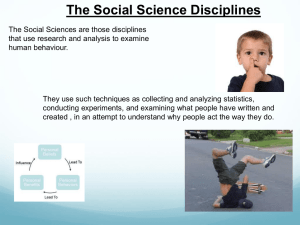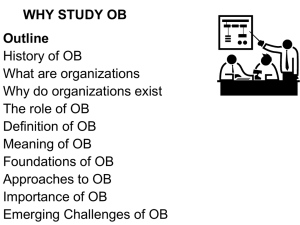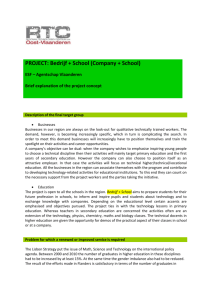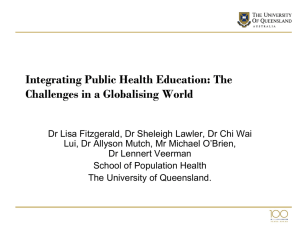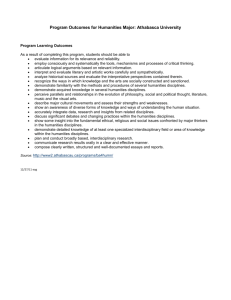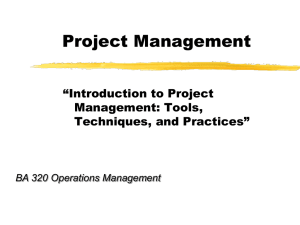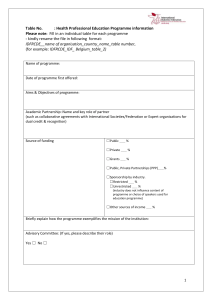Faculty Senate - Writing Program
advertisement
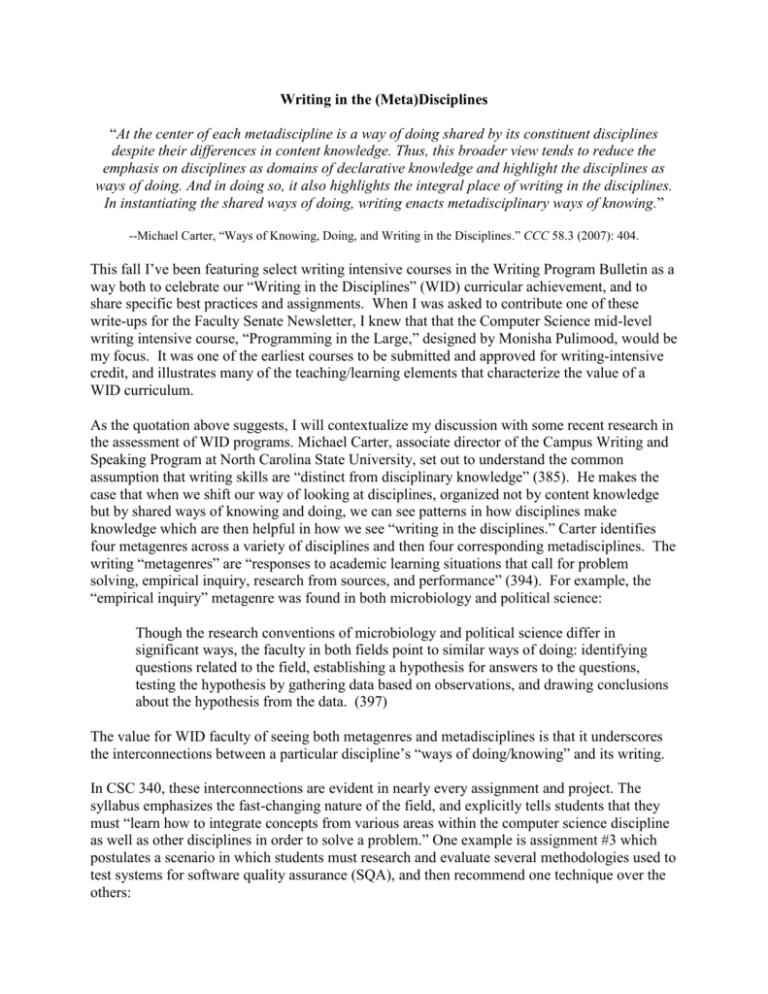
Writing in the (Meta)Disciplines “At the center of each metadiscipline is a way of doing shared by its constituent disciplines despite their differences in content knowledge. Thus, this broader view tends to reduce the emphasis on disciplines as domains of declarative knowledge and highlight the disciplines as ways of doing. And in doing so, it also highlights the integral place of writing in the disciplines. In instantiating the shared ways of doing, writing enacts metadisciplinary ways of knowing.” --Michael Carter, “Ways of Knowing, Doing, and Writing in the Disciplines.” CCC 58.3 (2007): 404. This fall I’ve been featuring select writing intensive courses in the Writing Program Bulletin as a way both to celebrate our “Writing in the Disciplines” (WID) curricular achievement, and to share specific best practices and assignments. When I was asked to contribute one of these write-ups for the Faculty Senate Newsletter, I knew that that the Computer Science mid-level writing intensive course, “Programming in the Large,” designed by Monisha Pulimood, would be my focus. It was one of the earliest courses to be submitted and approved for writing-intensive credit, and illustrates many of the teaching/learning elements that characterize the value of a WID curriculum. As the quotation above suggests, I will contextualize my discussion with some recent research in the assessment of WID programs. Michael Carter, associate director of the Campus Writing and Speaking Program at North Carolina State University, set out to understand the common assumption that writing skills are “distinct from disciplinary knowledge” (385). He makes the case that when we shift our way of looking at disciplines, organized not by content knowledge but by shared ways of knowing and doing, we can see patterns in how disciplines make knowledge which are then helpful in how we see “writing in the disciplines.” Carter identifies four metagenres across a variety of disciplines and then four corresponding metadisciplines. The writing “metagenres” are “responses to academic learning situations that call for problem solving, empirical inquiry, research from sources, and performance” (394). For example, the “empirical inquiry” metagenre was found in both microbiology and political science: Though the research conventions of microbiology and political science differ in significant ways, the faculty in both fields point to similar ways of doing: identifying questions related to the field, establishing a hypothesis for answers to the questions, testing the hypothesis by gathering data based on observations, and drawing conclusions about the hypothesis from the data. (397) The value for WID faculty of seeing both metagenres and metadisciplines is that it underscores the interconnections between a particular discipline’s “ways of doing/knowing” and its writing. In CSC 340, these interconnections are evident in nearly every assignment and project. The syllabus emphasizes the fast-changing nature of the field, and explicitly tells students that they must “learn how to integrate concepts from various areas within the computer science discipline as well as other disciplines in order to solve a problem.” One example is assignment #3 which postulates a scenario in which students must research and evaluate several methodologies used to test systems for software quality assurance (SQA), and then recommend one technique over the others: Assume that you work for a software development organization that has recently hired a new Chief Executive Officer (CEO). This CEO wants to ensure that the organization uses the latest technology and has assigned you the task of surveying the state-of-the-art on testing practices and software, and making a recommendation. In order to make an informed decision, you will survey some current testing techniques, find one that piques your interest, and research it further. For the purposes of this report, restrict yourself to code testing. Beta testing is not an appropriate choice for this assignment. You will then write a report to the CEO, that addresses at least the following: Brief summary of white box and black box testing, and regression testing – about ½ to 1 page each A more in-depth discussion of one other technique – about 1 to 1½ pages Your recommendation with justification, including what influenced your decision, advantages and disadvantages, software tools that aid in the testing process using this technique (include open source tools), major organizations (or categories of organizations) that typically use this technique, and anything else that interests you about this testing process Conclusions that emphasize the appropriateness of your recommendation. The rubric—used both for providing feedback on the draft report and for grading the revised report—emphasizes everything from the report format, to diction, to sentence construction, to the analytic skills necessary to justify the recommendation. Students must be able to assess the tradeoffs of the various methodologies. Without a through comprehension of SQA, of the techniques being researched, and of the strengths and weaknesses of the application of these techniques, students cannot write the report. In other words, they can do neither the writing nor the ways of knowing expected of computer science majors. The importance given to writing as an enactment of ways of knowing is also evident in the five programs students must write for this course. The reports will include “six to eight pages of source code each. Each program also requires a minimum of two pages of maintenance documentation that includes well-written comments describing the purpose of the assignment, purpose of various code fragments, as well as pre- and post-conditions and usage for each function.” Students must be able to “do” the source code, but in order to show that they understand it conceptually, they must also be able to write about it. They must, to borrow Carter’s phraseology, demonstrate not only the “knowing that” but also the “knowing how.” If you would like to read more about Carter’s work at NC State, including how other disciplines in the sciences and humanities were grouped, just email me (goldschm@tcnj.edu) and I’d be happy to send you the pdf. Mary Goldschmidt Director, Writing Program

